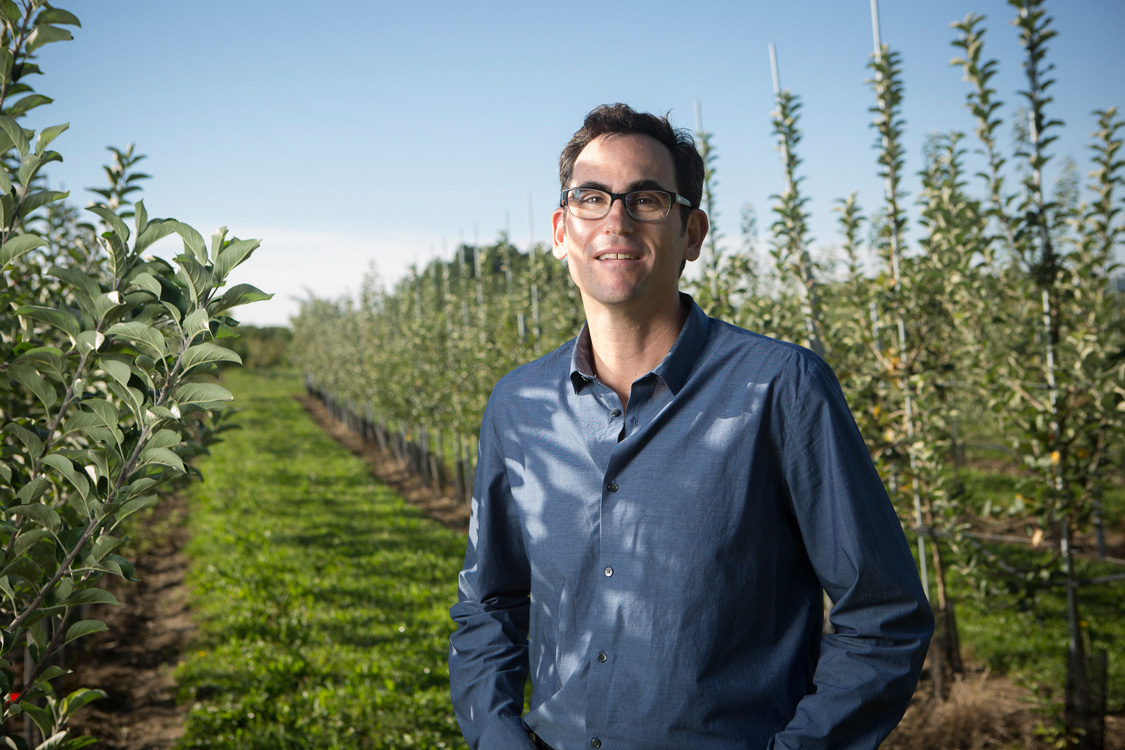Cornell research points the way to better hard cider
By Krisy Gashler

Consumer interest in hard cider in North America has blossomed in the past five years, and apple growers are racing to catch up. Cornell research is revealing ways in which apples grown with specific orchard management practices can produce more desirable hard cider for consumers in this surging market.
Gregory Peck, assistant professor in the Horticulture Section of the School of Integrative Plant Science, found standard orchard conditions for apples grown for consumption – the vast majority of orchards in the U.S. – are very different from the ideal conditions for hard cider apples.
Apples grown for raw consumption are thinned on the trees to a low-crop load, so that each apple grows bigger, juicier and sweeter. But for hard cider, a heavier crop load, with smaller, bitter fruits may be better, according to Peck’s research published in the September issue of HortScience. That’s because the smaller apples have a higher concentration of polyphenols, or tannins, which affect astringency and bitterness in the cider.
In wine production, there’s a body of research on how to influence tannins and flavor compounds, including which varieties to plant, how much sunlight and fertilization to provide, and preferred crop-load density. Peck is trying to apply the lessons learned by winemakers to the budding hard cider industry.
For the study, the researchers hand-thinned apple trees to three different crop loads, rated as low, medium and high densities. Peck found that, at harvest, juice made from fruit from these treatments did not differ in total polyphenol content. However, following fermentation, the medium crop load and high crop load had 27 percent and 37 percent greater total polyphenol content, respectively, than the low crop load.
“Greater polyphenol content gives the perception that there is a greater amount of mouthfeel in the cider, and that’s a vital aspect to the consumer experience,” said Peck. “By focusing on fruit quality characteristics that are desirable for cider production, orchard managers can produce better apples to fuel this growing market segment.”
Hard apple cider was widespread throughout the American colonies from the time Europeans began immigrating to North America until Prohibition, in the 1920s. Hard cider has remained popular in Europe, but it has only recently enjoyed a revival in the states. Within the past five years, U.S. cider consumption has increased by 850 percent, Peck said.
“It’s the fastest growing segment of the alcohol industry,” he said. “It’s relatively small proportionally to wine and beer, but it’s the fastest growing. All the major multinational beverage companies have cider companies now.”
Apple growers approached Peck to do more research into hard cider production. “We see this as an opportunity for diversification, which adds to sustainability. And it’s a value-added product, so it’s a way for farmers to make more money from their produce,” Peck said.
New York state is at the forefront of the hard cider revival: There are about 75 hard cider producers in New York, more than in any other state, Peck said. There’s also new interest from students: Beginning in spring 2017, Cornell will offer courses in cider production, including a course that covers the history and culture of cider, a lab where students will spend time in Cornell’s teaching winery and at commercial cideries, and a course on orchard management.
As further evidence of the renewed interest in hard cider, the Finger Lakes region will celebrate Cider Week Oct. 1-9. Peck and the Cornell Hard Cider Program Work Team will host tours of the Cornell Orchards Sunday, Oct. 2, from noon to 4 p.m., with walking tours at 1 and 3 p.m. The tours will include information about hard cider research at Cornell and apple tastings featuring several traditional European varieties, which are far more bitter than the varieties grown in the U.S.
“The European varieties are called ‘spitters,’” Peck said. “They’re so bitter you don’t want to eat them; you spit them out of your mouth. But once they’re turned into cider, it really improves the mouthfeel.”
For more information on Cornell Cooperative Extension’s Hard Cider Program Work Team, and the new course offerings in Hard Cider production, see: blogs.cornell.edu/hardcider.
Krisy Gashler is a freelance writer for the College of Agriculture and Life Sciences.
Media Contact
Get Cornell news delivered right to your inbox.
Subscribe